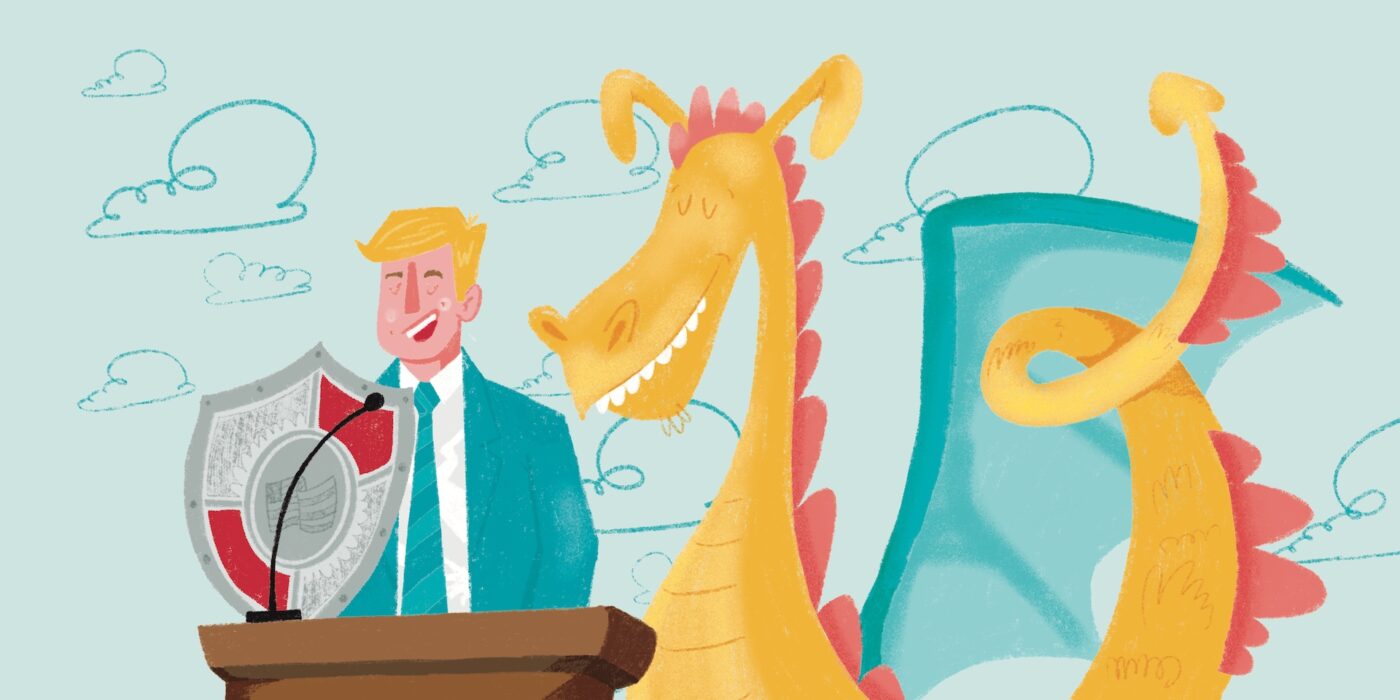In 2018, more than 1,700 candidates ran for the U.S. Congress. And 98% had websites. Most featured lengthy biographies.
“So here’s a dataset for a behavior that encompasses almost everyone in Congress,” says Betsy Sinclair, professor and chair of political science in Arts & Sciences. “And no one in my field was studying it.”
Billy Acree, professor of Spanish in Arts & Sciences, noticed something else. The biographies followed certain rules. “Beginnings are always humble. The politician leaves home. They gain experience. They return to fight a dragon,” whether that’s big business or big government or simply the other party.
In other words, political biographies belong to a distinct literary genre: the fairy tale.
Sinclair and Acree might seem unlikely collaborators. Sinclair analyzes big data related to U.S. elections. Acree studies how narrative influences daily life. But in 2022, they were appointed co-directors of Arts & Sciences’ Incubator for Transdisciplinary Futures, which supports collaborative research. And through the incubator, they discovered a shared interest in storytelling.
“Stories are built into almost everything,” Acree says. “Stories shape our sense of purpose.”
“Stories are built into almost everything. Stories shape our sense of purpose.”
Billy Acree
In the spring, with backing from the university’s strategic plan, “Here & Next,” and the Frick Initiative, Sinclair and Acree co-taught “The Stories That Win,” a seminar focusing on origin stories. How do people talk about their lives? Do politicians tell the same kinds of stories as CEOs, athletes or academics? Why do particular stories survive over time?
The class collected thousands of origin stories: myths and fairy tales and personal biographies, but also the stories of places and artifacts and moments in time. With programmers in WashU’s Digital Intelligence & Innovation Accelerator, they built an extensive — and still growing — online database. Students also wrote stories about their own origins: where they’re from, what brought them to campus, their values and experiences.
“When people tell their stories, they begin to figure out who they are,” Sinclair observes. “Storytelling has an almost medicinal power. It’s a core component of identity.”
Amidst the data, Sinclair and Acree spotted measurable trends. Political incumbents tend to tell stories of accomplishment; challengers emphasize future possibilities. A similar split characterizes the origin stories of established companies and startups.
Surprisingly, they found little difference in the type of stories told by winning and losing candidates. “The required formula is so pervasive, it’s almost a test for office,” Sinclair says. Within the formula, the emotion of the storyteller and small differences in plot points stand out. “This is why we say, ‘It’s the story that wins,’” she says.
One brave candidate visited the class. “We gave him two and a half minutes to tell us his origin story,” Sinclair remembers.
The candidate was good. His delivery was folksy yet practiced. He had a firm gaze. The students paid attention. After finishing, he asked the group, “What do you think?”
“The students tore it apart,” Sinclair says. “‘You should reorganize the structure.’ ‘You should expand this detail.’ ‘You need to start with humble beginnings.’”
The candidate listened. His campaign manager took notes. The next morning, his website had been updated.
“He didn’t change the facts of the story,” Sinclair says. “But he changed the way he told it.”



